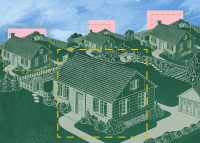The housing market continued to roar with 6.85 million homes sold last month, but the shrinking pool of available homes has driven up prices.
That number represented a 4.3 percent increase compared to September’s 6.5 million homes sold, and an annual jump of nearly 27 percent, according to the National Association of Realtors’ monthly report.
The fifth consecutive month of gains in existing home sales comes as supply hit an all-time low with just 1.42 million properties for sale. At the current sales pace, all existing inventory would be sold in 2.5 months. That’s a drop of nearly 20 percent compared to the 1.77 million homes on the market a year ago.
Lawrence Yun, NAR’s chief economist, noted that despite unprecedented levels of optimism from homebuilders and a jump in housing starts, a new wave of inventory has yet to hit the market in a meaningful way. He called for new ideas to increase U.S. housing stock.
“All measures, such as reduction to lumber tariffs and expansion of vocational training, need to be considered to significantly boost supply and construct new housing,” he said in a statement.
Read more



As a result of diminished inventory, prices continued to climb: The median sales price nationwide is now $313,000, a more than 15 percent jump from last October’s $271,100.
Despite higher price tags, homes sold at a fast and furious pace. NAR’s report found the typical home remained on the market for 21 days, with 72 percent of October sales having been on the market for under a month.
Yun said the surge in existing homes sales has now offset the losses the housing market took in the initial months of the pandemic, which he expects to continue.
“With news that a Covid-19 vaccine will soon be available, and with mortgage rates projected to hover around 3 percent in 2021, I expect the market’s growth to continue into 2021,” he said in a statement.
But it’s increasingly apparent that the housing market is being driven by wealthier buyers unaffected by job or income loss due to the pandemic, while others have been locked out of homebuying.
The housing market’s K-shaped recovery — where high earners recover faster than lower-income ones — could have dire implications for the broader economy and exacerbate inequality, economists warn.
